Responding to the potential torture or other ill-treatment suffered by detainee Muhammad Kosman – known as Muhammad Kace – at the hands of a fellow detainee at the National Police’s Criminal Investigation Department (Bareskrim) detention center, Usman Hamid, Amnesty International Indonesia’s executive director, said:
“Amnesty International is absolutely appalled to hear about the shocking treatment of Muhammad Kosman while in police custody – which may amount to torture or other cruel, inhuman or degrading treatment or punishment under international human rights law. The state and law enforcement authorities have an obligation to guarantee the rights of suspects in detention, including the right not to be subjected to torture or other ill-treatment.”
“Although these injuries were inflicted by a fellow detainee, this does not absolve the police officers of their duty to carry out effective supervision to prevent such acts from occurring in their custody.”
“We call on the National Police Chief to launch a thorough, transparent, and independent investigation of the incident and take all necessary steps to ensure that torture and other ill-treatment no longer occur within the Indonesian National Police. If there is sufficient preliminary evidence, the perpetrators must be brought to justice through a fair trial.”
“We also call on the authorities to ensure that the rights of all detainees, including Muhammad Kosman, are protected and that where they are facing credible accusations of internationally recognised offences they are afforded fair trials in compliance with international human rights law.”
Background
On 18 September 2021, Muhammad Kosman was allegedly beaten and smeared with excrement by fellow detainee and still active police officer Napoleon Bonaparte while in custody at the Bareskrim detention center in South Jakarta.
Muhammad Kosman had been held at the detention center as a suspect since 26 August 2021 after being arrested and charged with blasphemy the day before.
Regardless of the crimes they are accused of, all detainees have the same rights and these must be protected by the state. Such protection is regulated in several international human rights instruments, including the International Covenant on Civil and Political Rights (ICCPR), the United Nations Convention against Torture and Other Cruel, Inhuman or Degrading Treatment or Punishment (CAT), and the United Nations Regulations on Minimum Standards for the Treatment of Prisoners (the Nelson Mandela Rules).
Articles 7 and 10 of the ICCPR states that all persons, including detainees, must be treated humanely, with respect for human dignity, and shall not be subjected to torture or other cruel, inhuman or degrading treatment or punishment. The same point is also emphasized in Articles 1 and 2 of the CAT, which stipulates that no one should be tortured or subjected to cruel, inhuman or degrading treatment or punishment. Lastly, Paragraph 31 of the UN Standard Rules for Prisoners explicitly prohibits all cruel, inhuman or degrading treatment as punishment.

